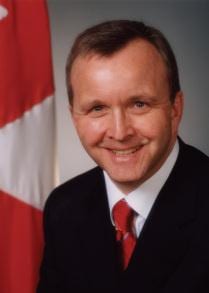Liberal Senator Grant Mitchell delivered a lengthy and comprehensive speech to the Senate April 16 in favour of NDP MP Randall Garrison’s private member’s Bill C-279.
The bill would add gender identity to the list of protected grounds under the Canadian Human Rights Act and under the hate crimes section of the Criminal Code.
Now in its second reading before the Senate, the bill passed through the House of Commons March 20 by a vote of 149 to 137.
“Adding this feature to the hate crimes section of the Criminal Code will send a very powerful message about a discriminatory behaviour that is absolutely unacceptable,” Mitchell said in his speech. “It will sustain the idea that the rights of transgender people must be recognized and respected and that transgender people must have the right to participate fully in Canadian society.”
If the government’s leader in the Senate, Marjory LeBreton, allows the bill to go to a vote and a majority of senators vote to pass the bill at second reading, it will go to committee — either the human rights, social affairs or legal and constitutional committee, Mitchell says. Bill C-279 will then have to enter and pass third reading before the governor general approves it.
Mitchell says he wants C-279 to become law before the Senate rises at the end of June.
“We’re told that the prime minister will prorogue in the fall and bring in a new throne speech,” Mitchell tells Xtra. “When you prorogue, everything is more or less back to square one. It would start all over again.”
The Senate currently comprises 63 Conservatives, 36 Liberals, three independents and one Progressive Conservative.
Mitchell says he has spoken to 30 Senators, and 15 have assured him they will support the bill. The majority of the remaining 15 are leaning toward supporting the bill, Mitchell says.
“I care deeply about these issues, and I am overwhelmed by the thought of somebody being mistreated, discriminated against, not having the advantages that I had simply because somebody thinks they are different,” Mitchell says. “Throughout my life I have always been driven by that.”
Mitchell served as the leader of the Alberta Liberal party from 1994 to 1998. Appointed to the Senate in 2005, he says passing the same-sex marriage bill is his greatest accomplishment.
Mitchell says the arguments against the trans bill are similar to the ones raised during the marriage debates.
“I use the default-to-disaster argument, which has now been proven to be so facile in the gay marriage case. It was going to ruin families and society. It hasn’t ruined families and it hasn’t ruined society. Now we have the equivalent default-to-disaster rule here is the bathroom one. It has no basis in logic and no basis in law.”
While the bill is expected to improve the lives of trans Canadians, Mitchell says, “There is absolutely additional work that needs to be done, and we need to be forever vigilant. This is not a panacea.”
During his Senate speech, Mitchell spoke of the disadvantages and discrimination trans Canadians face and referenced data from the Trans Pulse Project.
Jordan Zaitzow, Trans Health Connection coordinator for Rainbow Health Ontario, says the speech was impressive, but there remains a “real danger of leaving the folks who are at the frontlines, and the most affected by discrimination, behind.”
This has been unanimously true of human rights movements that are co-opted by legislative reform, Zaitzow says.
“Will the bill be responsive to the needs of trans women? Trans women of colour? Trans people doing sex work?” Zaitzow asks. “Or will it reinforce a division within trans communities between trans people who are privileged enough to benefit from legislation and those who are not?”
Amanda Ryan, of Ottawa trans support group Gender Mosaic, thinks Mitchell’s speech was “incredibly insightful and very complete” and touched on every topic of concern surrounding the bill.
The term gender expression was removed from the bill at the insistence of a group of Conservative MPs who also demanded a definition of gender identity in return for their votes.
Ryan says a definition is unreasonable as no other criteria in the Human Rights Act are defined.
While Mitchell says gender expression could always be added later, he wonders whether a definition is necessary. “It’s about what the bigot or the discriminator feels about that person. In a way, the definition is almost moot in some sense. The person who is beating that transgender person up has a deeply held belief about what they think that person is,” he explains.
As for those opposed to the bill, Mitchell believes there are some “pure bigots,” but most opposition comes from good people who are simply misinformed.
“Once we pass this bill and once this is put into place, if they meet transgendered people they begin to realize it’s overblown,” Mitchell says. “Let’s relax and be what we really are as Canadians, which is people who are compassionate and understanding and want to help their neighbours.”


 Why you can trust Xtra
Why you can trust Xtra


